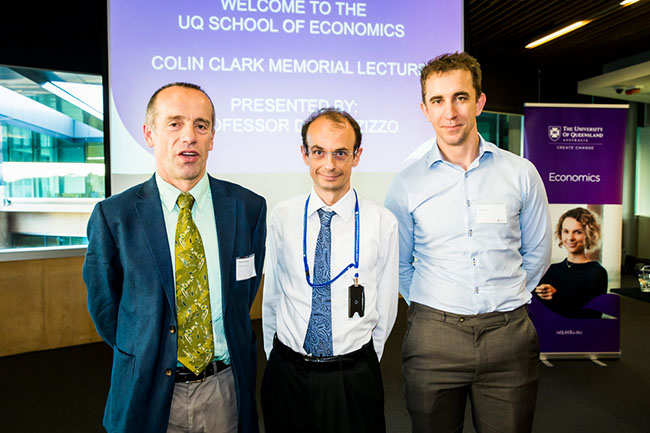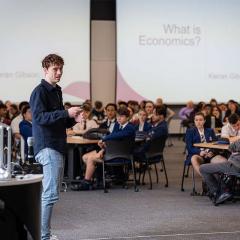How do people make decisions in an economic environment? What are the policy implications of these decisions? How can we influence or change decision-making behaviour?
The complexities of human decision-making were placed under the microscope at the 28th annual Colin Clark Memorial Lecture, hosted by the School of Economics.

Academic Dean and Head of School Professor Daniel Zizzo was this year’s guest speaker at the annual lecture, the School’s most prestigious event.
Professor Zizzo—a leading experimental and behavioural economist—said policy makers ignored the dimensions of decision-making at their own peril.
“We must have a better, richer understanding of decision-making to make a difference in people’s lives,” Professor Zizzo said.
“Policy makers must ensure that the decision environment has an evidence-based design.”
Professor Zizzo drew on three sample applications from his research to explain how people came to decisions in economic environments, and the policy implications of these decisions.
In one study modelled on the UK energy market, Professor Zizzo and his co-authors looked at why people were generally apathetic about shopping around for electricity tariffs.
“Because of this lack of consumer engagement, there is a perception on the part of regulators and policy makers that the market is not working,” Professor Zizzo said.
“In our experiment, we found that the complexity of electricity tariffs matters, but consumer inattention matters more when it comes to people deciding not to switch suppliers.
“People tend not to switch and to stick to the default because paying the electricity bill is not a part of their weekly routine. They’re not as concerned about saving money as they might be when they go to the supermarket and shop around for the best deals—even though higher electricity tariffs may have more of a financial impact."
“However, we found that if we changed the decision environment and made the best electricity tariff the default option, it reduced sub-optimal outcomes for consumers.”
Professor Zizzo also applied examples from two other co-authored studies: one that examined the impact of higher social comparison pressure on technological innovation and adoption, and another that explored the effect of a signposted sugar tax on the purchase of unhealthy breakfast cereals and sugary drinks.
Around 100 prominent economics academics, industry professionals, government representatives and students filled UQ’s Terrace Room for the lecture.
The guest list also included Joe Clark, Dr Colin Clark’s grandson and a quantitative strategist at the Queensland Investment Corporation.
The Colin Clark Memorial Lecture is held each year to recognise Dr Clark’s outstanding contribution to the field of economics.
Dr Clark was a British and Australian economist, former UQ economics academic, and eminent public servant with the Queensland Government during the 1930s and 40s.
His work on national income accounting was fundamentally important to the development of macroeconomics and to the approach of John Maynard Keynes. Dr Clark's greatest contribution to economics was his pioneering role in the construction of national accounts.
View the Colin Clark Memorial Lecture photo gallery
Media: Alysha Hilevuo, media@bel.uq.edu.au, +61 7 3346 9349



